Grenfell United’s powerful response to the Grenfell Inquiry Report
By Grenfell United
Today (September 4) marks the conclusion of a painful six years listening to the evidence of the deaths of 54 adults and 18 children, our loved ones, neighbours and friends. It is a significant chapter in the journey to truth, justice and change. But justice has not been delivered.
The inquiry report reveals that whenever there’s a clash between corporate interest and public safety, governments have done everything they can to avoid their responsibilities to keep people safe. The system isn’t broken, it was built this way.
It speaks to a lack of competence, understanding and a fundamental failure to perform the most basic of duties of care.
The recommendations published today are basic safety principles that should already exist, highlighting how the government’s roles duties and obligations have been hollowed out by privatisation.
Where voids were created as the government outsourced their duties, Kingspan, Celotex and Arconic filled the gaps with substandard and combustible materials. They were allowed to manipulate the testing regimes, fraudulently and knowingly marketing their products as safe.
Sir Martin Moore-Bick has laid bare his mistrust in the building industry – no single publication like approved document B should subsequent be used as a means to regulate fire safety and to keep the public safe.
The government knew this was no way to regulate. It was there to be exploited.
Our lawyers told the inquiry that the corporate core participants – Arconic, Kingspan and Celotex – were ‘little better than crooks and killers’. The report makes clear that this statement is entirely true. We were failed in most cases by incompetence and in many cases by calculated dishonesty and greed.
The duty of government should be to safeguard life, whilst protecting us from corporate greed. But for too long, they have aided corporations, facilitating them to profit and dictate regulation.
It is a damning indictment for this country that amateurs (like Carl Stokes and Brian Martin) can pose to be experts, putting countless lives at risk and taking the lives of our loved ones.
There’s a reading of the inquiry hiding in plain sight that speaks to both the damage done to Grenfell Tower and the wider damage done to Britain.
It’s a serious problem for the whole country when governments invite corporations to write their own rules.
The government must now exert control over the sector to prevent further dismantling of public safety, which used to be understood as their primary job, not aiding and abetting crooks and killers.
To prevent a future Grenfell, the government needs to create something that doesn’t exist: a government with the power and ability to separate itself from the construction industry and corporate lobbying, putting people before profit.
Over and above all, the judge concludes what we already knew, that every single loss of life was avoidable.
We expect this government to break old habits and implement all of the recommendations made by Sir Martin Moore-Bick from the Inquiry report without further delay, because the time to address this is already three decades too late.
We are calling on the government to ban Arconic, Kingspan, Celotex and Rydon from central or local government procurement processes. And finally start acting in the British public’s interest.
We have an expectation that the Met Police and the CPS ensure that those who are truly responsible are held to account and brought to justice.
We must never forget that at the heart of this Inquiry report is the fact that 72 people lost their lives.
- This statement from Grenfell United was published in response to the Grenfell Phase 2 Inquiry Report on September 4th.
- Grenfell United are survivors and bereaved families from the Grenfell Tower fire, who have come together to demand justice and change in memory of 72 of our families and neighbours who died. You can follow them on Twitter/X here.
The inquiry published on Wednesday revealed the lack of fire safety in residential buildings and the stark failures of the UK government and construction industry.
Danita Yadav
6 September 2024

A public inquriy into the Grenfell Tower Blaze found that all 72 deaths were "avoidable" | Photo: AP
Seven years later after a horrific fire at London's Grenfell Tower claimed 72 lives, a public inquiry into the fire has revealed that all of the deaths could have been avoided.
The inquiry published on Wednesday revealed the stark failures of the UK government, the construction industry and the lack of fire safety in residential buildings.
1,700 pages pointed out that the deadly fire was the end result of "decades of failure" where profit was placed over people.
What Was The Grenfell Tower Blaze?
On June 14, 2017, a high-rise fire broke out at Grenfell Tower flats in West London. The fire at the 24-storey building burned for a total of 60 fires and claimed 70 lives due to the fire.
Two others died after they succumbed to the injuries caused by the apartment blaze. The fire which started as an electrical fault and kitchen fire on the fourth floor, soon spread to the cladding panel of the building.
The fire began to spread rapidly and firefighters then saw another fire on the fifth floor. Residents fled to higher floors as large quantities of debris began to fall. While some managed to escape the fire, many residents fell to their deaths due to the intensity of the flames.
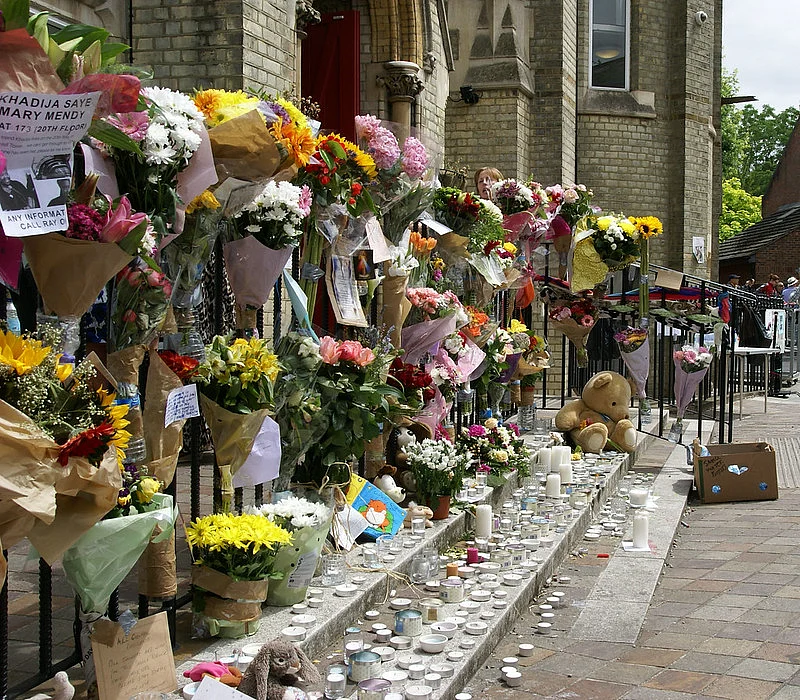
Floral tribute for the victims of the Grenfell Tower blaze outside Notting Hill Methodist Church Photo: Flickr/ ChiralJon
The fire which started at 12:54 AM BST spread at a "terrifying rate" and by 1:30 AM, the blaze grew out of control. The fire was brought under control around midnight of June 15 and was declared extinguished on June 16, 2017.
Of a total of 293 residents in the building, 223 people managed to escape the fire and were rescued by firefighters. A total of 72 people were killed in the incident, including a large number of children.
The Grenfell Tower Blaze also etched itself into history by becoming one of the deadliest residential building fires in the UK since the Blitz during World War 2.
What Has The Inquiry Revealed?
Over the 1,700 page inquiry, the words "incompetence", "greed" and "dishonesty" found multiple mentions. As per the inquiry's chair Martin Moore-Bick, all 72 deaths caused due to the blaze "were all avoidable".
Seven years of research and investigation pointed the blame on the companies involved in the maintenance and refit of the tower. The report added that companies had dishonestly marketed combustible cladding materials as safe.
The inquiry named three major firms - Arconic, Kingspan and Celotex - and accused them of "misleading the market". Architects Studio E and the the builders from Rydon and Harley Facades were also held responsible for the blaze.
The Theresa May government was also brought under fire, along with the local authorities of Kensington and Chelsea for their inaction over fire safety in high-rise buildings.

Charred remains of Grenfell Tower captured on June 17, 2017 Photo: Flickr/ ChiralJon
"Not all of them bear the same degree of responsibility for the eventual disaster, but as our reports show, all contributed to it in one way or another, in most cases, through incompetence, but in some cases, through dishonesty and greed," said Moore-Bick.
Grenfell United, a group representing the families of the victims and survivors of the fire called out the government for its failure to safeguard life.
"The duty of government should be to safeguard life, whilst protecting us from corporate greed. But for too long, they have aided corporations, facilitating them to profit and dictate regulation," said Grenfell United.
With the release of the much-awaited inquiry, police have revealed a total of 58 people and 19 organisations have been put under investigation. However, due to the delayed report, any prosecutions over corporate manslaughter and fraud for the accused remain years away.
The 2024 report comes years after the initial report in 2019 which examined the sequence of events on the night of June 17, 2017, and the actions of the fire brigades.
The 2019 report, which was phase one of the inquiry revealed the cause of the fire - an electrical fault in the refrigerator - and the reason behind the rapid spread of the fire - the building had been covered with cladding made from flammable aluminium composite material which acted as a source of fuel
The phase one report also praised the courage of the firefighters but highlighted the failure among fire brigade chiefs who had not been prepared for the Grenfell fire.
One of the major criticisms was the "Stay put" strategy deployed by the fire brigade as not only did it trap residents inside the tower as they watched it burn but it also took lives which could have been saved easily.
Grenfell Surivivors, Victims 'Failed For Years'
Following the publication of phase two of the inquiry report, newly elected Prime Minister Keir Starmer apologised to the relatives of victims and survivors of the Grenfell tower on behalf of his predecessors.
"It should never have happened. The country failed to discharge its most fundamental duty, to protect you and your loved ones," said Starmer during a session of the parliament."
The Labour leader also expressed his admiration for the strength to relive the events of Grenfell while giving evidential accounts for the inquiry report and called for a "day of justice".
Michael Keohan
BBC Kent Political Reporter•@MichaelKeohan
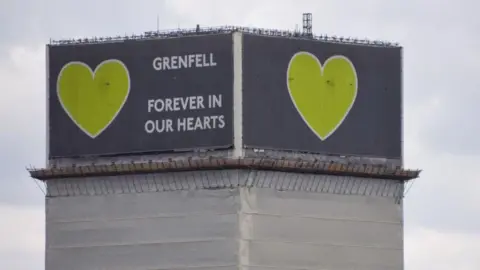
A Kent-based frmer firefighter who attended the Grenfell Tower blaze has said “lessons need to be learned now".
Aldo Diana, from Edenbridge, served as a London firefighter for over 30 years and helped save lives in the fire in June 2017.
Speaking to BBC Radio Kent, Mr Diana said: “I’ve been to many fires over my time, but nothing as alarming as this."
Mr Diana said the fire had “taken its toll” on his mental health and left him wondering “what he could have done better”.
On Wednesday, the six-year public inquiry's damning final report blamed the disaster on "dishonest" companies and a chain of failures by governments.
A cladding manufacturer “deliberately concealed” fire risks, while coalition and Conservative governments “ignored, delayed or disregarded” concerns, the report found.
It also said the local council had shown a “persistent indifference” to fire safety and the needs of vulnerable residents.
The London Fire Brigade Commissioner Andy Roe said the fire service was "not complacent" and would “continue to act on the inquiry's findings".
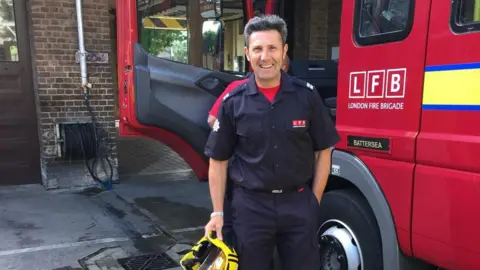
Aldo Diana served as a London firefighter for 30 years
Recalling the night of 14 June 2017, Mr Diana said it was a "normal shift to start off with” but said the scale of the fire soon dawned on him and his colleagues.
“It wasn’t until we got closer to the tower block you realised what a disaster it would be," he added.
Mr Diana rescued nine people on the night, carrying one person down 13 floors.
Speaking of his hopes for the future, he said: “We need to learn, there are still people living in blocks that are unsafe.
"We need to learn the lessons now, not in six months' time.”
Grenfell inquiry slams Lord Pickles and the Tory deregulation agenda
Lord Pickles said to be the only person in his department who thought fire safety issues were exempt from his government’s deregulation policy
by Anthony Robinson
05-09-2024

image by Ministry of Housing, Communities and Local Govt. Flickr
The final report into the Grenfell tragedy published yesterday was highly critical of Eric (Lord) Pickles the communities secretary at the Department for Communities and Local Government (DCLG) between 2013 and May 2015. Lord Pickles had told the inquiry into the appalling fire which took 72 lives in West London in 2017, that he was “genuinely amazed” that civil servants weren’t aware that his government’s deregulation drive didn’t include fire safety.
Pickles claimed that it was “ludicrous” that officials in the Building Regulations and Standards Division should have thought that Part B of the regulations dealing with fire safety matters in and around buildings in England, was subject to the Conservative’s deregulation policy. He said that would have been “wholly disproportionate” and “utterly inexplicable” and blamed his staff for making “political assumptions”.
However, the inquiry found that the evidence given by officials inside the DCLG was “strikingly different” from his.
Only Lord Pickles thought fire safety was outside the deregulation policy
The Rt Hon Sir Martin Moore-Bick, who has chaired the inquiry, said he was “unable to accept his [Lord Pickles’] evidence on that question”. Moore-Bick said none of the documents or any of the witnesses, other than Lord Pickles, supported the conclusion that the fire safety regulations were “exempt” from the policy.
While Lord Pickles was communities secretary the report says, “deregulatory considerations appear to have permeated every aspect of the department’s development, assessment and implementation of policy. Far from its being inexplicable that officials were under the impression that the Building Regulations and Approved Document B were subject to the various demands of the policy, the documents demonstrated in clear terms that their understanding was correct”.
The report concluded there was a “wealth of material that showed both that he was personally an ardent supporter of the government’s deregulation policy and that the pressure within the department to reduce red tape was so strong that civil servants felt the need to put it at the forefront of every decision”.
Officials spent ‘inordinate’ amount of time on deregulation
Anthony Burd, principal fire safety professional at the DCLG told the inquiry that officials “spent an inordinate amount of time looking at how they could deregulate”. The “one [regulation] in, one out” rule was introduced by the coalition in January 2011 and extended to “one in, two out” in January 2013. By March 2016 it had become “one in, three out” as ministers sought desperately to slash more and more ‘red tape’.
Burd said it became increasingly difficult to oversee the building regulations because of the reduction in the number of staff and the changes involved in deregulation.
In his report, Moore-Bick said although ministers had excluded the regulatory reform (fire safety) order 2005 from the ‘red tape challenge’ in 2012, a point Pickles made in his evidence, it only served to “reveal the limits of his understanding of the distinction between fire safety regulations on the one hand and the Building Regulations and Approved Documents as they related to fire safety on the other.”
While Moore-Bick mentioned the “one in, one out” policy and the “red tape challenge” which ran from 2011 until 2014, he could have referred to twenty other initiatives and challenges to reduce red tape and the regulatory burden that Yorkshire Bylines listed in 2022, seven of which came after the Grenfell fire.
James W Kelly
BBC News
Ayshea Buksh
BBC London
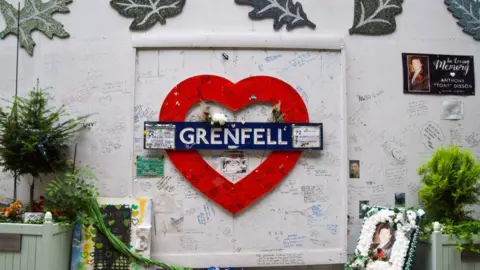
The Grenfell Inquiry found the 72 deaths were "avoidable"
"For us it's about coming together and figuring out what our next steps are as a community."
That's according to Paul Menacer, a survivor of the Grenfell Tower fire, as he and his neighbours continue to digest the findings of the inquiry's 1,700-page final report.
The deaths of all 72 people in the 2017 blaze in west London were avoidable and had been preceded by "decades of failure" by government, other authorities and the building industry, inquiry chairman Sir Martin Moore-Bick's report concluded.
Mr Menacer echoed many survivors and bereaved in saying the next steps toward justice lie with the Metropolitan Police and Crown Prosecution Service (CPS).
Grenfell Report: Key findings from the inquiry
Speaking at a vigil held on Wednesday evening, he said that although the tragedy is "still raw" within the community seven years on, it has strengthened bonds.
"The amazing thing about our area is the fact we have so many people from [multiple] cultures, backgrounds, races all [together] as one," he added.
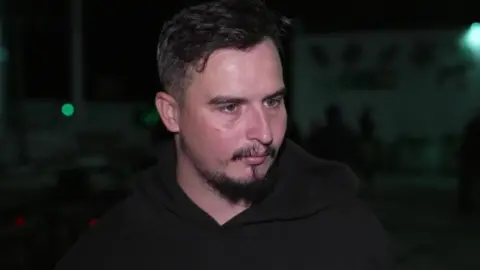
Paul Menacer says the community has "come together"
Samia Badani, who organised a community screening of Sir Martin's inquiry remarks at the Maxilla Social Club, said it had laid the "first steps" towards "accountability and justice".
"[The inquiry] gave us the truth, but it did not give us justice. It has given our community, Grenfell United, those fighting for justice, the means to hold those responsible accountable," she said.
Francis Dean, who lost his close friend Zainab Deen and her two-year-old son Jerimiah in the fire, said seeking justice for them would be his focus.
"Somebody has to be responsible. Even if it's the whole lot of them, they have to be responsible for it," he added.
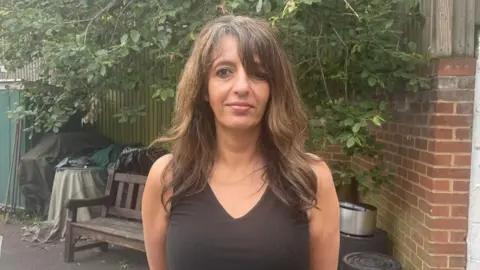
Samia Badani said the inquiry was among the "first steps"
Grenfell survivors Miguel Alves and Antonio Roncolato said they are glad the report highlights that lives "could have been saved" on the night of the fire.
Speaking to BBC Breakfast, Mr Alves said it is now down to the police to get the "justice that we need".
Rayner says unsafe cladding must be removed faster
Grenfell bereaved hope political promises ring true
Grenfell Tower fire: What happens next?
The Metropolitan Police has said it will need an estimated 12 to 18 months to pore over the inquiry's report "line by line" before any criminal charges are brought.
Mr Roncolato said: "Waiting another 18 months... so be it.
"We want to see those responsible, with blood on their hands, held to account."
The pair added they want to see action, a time frame and a plan.
Deputy Assistant Commissioner of the Met Stuart Cundy said on Wednesday: “Our police investigation is independent of the public inquiry.
"It operates under a different legal framework and so we cannot simply use the report’s findings as evidence to bring charges."
He added that in order to "secure justice for those who died and all those affected by the fire" a thorough investigation was needed, which would take "at least 12-18 months".

No comments:
Post a Comment